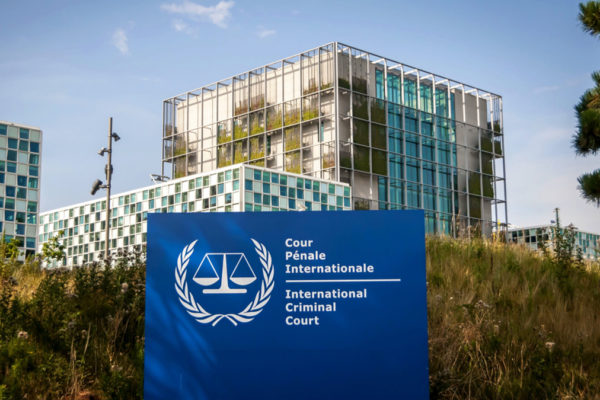WashU Expert: Trump Administration ‘war’ against The Hague not over
The Trump Administration announced the U.S. will deny or revoke visas for International Criminal Court staff, a move aimed at deterring a potential investigation by the court into alleged war crimes and crimes against humanity committed by U.S. troops in Afghanistan. The decision represents a rejection of the international rule of law, said Leila Sadat, director of the Whitney R. Harris World Law Institute.
Crimes against humanity must be prosecuted for International Criminal Court to succeed
Successful prosecutions of crimes against humanity must occur at the International Criminal Court if it is to succeed in its mandate to punish perpetrators of atrocities and deter others from committing such crimes, argues Leila Sadat, JD, international law expert and WUSTL professor. Her research, arguments and analysis are published in the latest issue of the American Journal of International Law.
Atrocities Prevention Board could significantly change U.S. foreign policy
President Barack Obama recently announced the establishment of an Atrocities Prevention Board as part of his comprehensive strategy to prevent genocide and mass atrocities. “For the first time, the National Intelligence Council will prepare an estimate on the global risk of mass atrocities and genocide,” says Leila Nadya Sadat, JD, international law expert and director of the Whitney R. Harris World Law Institute at Washington University in St. Louis School of Law. “By sensitizing the diplomatic and intelligence communities to atrocities risk and systematizing responses to potential crises, the policies of the Atrocities Prevention Board could significantly change in U.S. foreign policy,” she says.
Violence in Syria, Libya underscores need for convention on crimes against humanity
The violence against peaceful protesters in Libya and Syria drives home the need for an international convention for the prevention and punishment of crimes against humanity, says Leila Nadya Sadat, JD, international law expert and director of the Whitney R. Harris World Law Institute at Washington University School of Law. “The concerted efforts of the international community have helped to bring about a resolution of the Libyan situation, but the situation in Syria continues to deteriorate,” she says. “Reports of civilian roundups in Syria are reminiscent of Nazi roundups of the Jews during WWII. History shows that widespread human rights abuses lead to ethnic cleansing, crimes against humanity and even genocide.”
Crimes Against Humanity Initiative releases final text of proposed international treaty
The Crimes Against Humanity Initiative at the Whitney R. Harris World Law Institute of Washington University in St. Louis School of Law recently released the text of a proposed multilateral treaty on the prevention and punishment of crimes against humanity. Leila Nadya Sadat, JD, director of the initiative, says that this is the first time that such a convention has been drafted.
Crimes Against Humanity project to draft international treaty
The Whitney R. Harris World Law Institute of the School of Law announced a two-year project to study the international law regarding crimes against humanity and to draft a multilateral treaty condemning and prohibiting such crimes. Leila Sadat, J.D., the Henry H. Oberschelp Professor of Law and director of the Harris Institute, recently convened the […]
Crimes Against Humanity project to draft international treaty
The Whitney R. Harris World Law Institute of the School of Law announced a two-year project to study the international law regarding crimes against humanity and to draft a multilateral treaty condemning and prohibiting such crimes.
Harris World Law Institute kicks off landmark Crimes Against Humanity Project
The Whitney R. Harris World Law Institute of Washington University School of Law announced a two-year project to study the international law regarding crimes against humanity and to draft a multilateral treaty condemning and prohibiting such crimes. Leila Sadat, J.D., the Henry H. Oberschelp Professor of Law and director of the Harris Institute, recently convened the first meeting of the project’s steering committee.
Is the Saddam Hussein trial one of the most important court cases of all time? Not necessarily, says international law expert
Sadat”In arguing that the Saddam Hussein trial is a ‘Trial of the Century,’ some experts appear to be suggesting that media interest is tantamount to success, importance and legitimacy. This is a mistake,” says Leila N. Sadat, expert on international law and international war crimes tribunals and professor of law at Washington University in St. Louis. “Criminal trials, whether of important and notorious individuals, or of small-time offenders accused of petty crimes, are nothing more than show trials, unless three criteria are met: The judges must be independent, well-qualified and impartial; the accused must be properly and effectively represented; and the proceedings must be fair. Using these criteria, it is difficult not to be skeptical about the fairness, and therefore the ultimate significance, of the trial of Saddam Hussein.”
Prince of Jordan to deliver lecture on the International Criminal Court March 18
Prince Zeid Ra’ad Zeid Al-Hussein of Jordan will deliver a lecture on “The International Criminal Court: Future Challenges,” on March 18 at noon in Anheuser-Busch Hall, Room 309. Al-Hussein is the permanent representative of the Hashemite Kingdom of Jordan to the United Nations and president of the Assembly of States Parties for the International Criminal Court.
View More Stories

